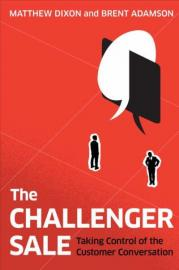 To find out how to challenge the customer’s thinking without challenging the customer, I asked Matt Dixon, co-author of the Challenger Sale and Executive Director of the Corporate Executive Board, for the answer. (Click here for video interview).
To find out how to challenge the customer’s thinking without challenging the customer, I asked Matt Dixon, co-author of the Challenger Sale and Executive Director of the Corporate Executive Board, for the answer. (Click here for video interview).
Q: How do you challenge the customer’s thinking without challenging the customer?
A: If we’d found that The Challengers were obnoxious and aggressive; we’d have called them The Jerk not The Challenger.
Q: Are stories the most effective way?
A: The most progressive challenger organizations use a savvy combination of data that appeals to the rational side of the customer, but also stories that appeal to the emotional side of the customer.
Q: Peter Guber, author of Tell to Win, uses a metaphor of a Trojan horse to explain how you can use stories to deliver the factual data so that it gets past the Buyer’s established wall of thinking. What’s your view?
A: It’s a fantastic metaphor and when you look at the companies like Granger that do this the best, they show data but that only gets them part of the way there. That accomplishes the task of rational drowning. But then they have to go through the emotional drowning to really make it personal for the customer. To make the customer feel the pain of this foregone opportunity, unseen risk or cost. And then they show them the way out.
If we’d led with all those things (our catalogue, our inventory, our number of distribution centers), we haven’t given them a reason to care. But when we can tell them a story that leads them to your unique benefits, rather than leading with your unique benefits, wow, that’s a powerful thing.
Q: Clients’ tell me a Stories that Sell Workshop is fantastic because, unlike other training programs, they say the deliverables (i.e. stories) don’t end up as shelf ware since it’s something that they can use tomorrow. What’s your view?
A: You get some fantastic stories right off the bat such as I tried this story in my latest sales meeting and it really worked. It broke through with a customer who had been giving us the stiff arm for years and I finally broke through to them in a way that I haven’t before. They want to get me in front of their senior management team to share that insight. And so you can get those quick wins.
Q: Consulting firms like McKinsey use hypothesis based selling vs. a question based discovery approach because it avoids the customer suffering from solution selling fatigue. What’s your view?
A: It doesn’t mean that asking questions is unimportant. It’s of course important. And the best salespeople ask great questions. But they don’t lead with questions, they lead with insights. They save their questions for the point in the sale when they need to understand how to customize their solution for their customer’s business.
The ones who get it most quickly are quite frankly from professional services. It’s the consultants of the world. And the reason is this is the way they’ve been selling for years. Is by leading with insight that changes the way the customer thinks about their business or their world and ties it to the unique capabilities that the consulting firm can offer. And so really, in some respects, it’s almost taking what has been a tried, tested and validated approach at the high end of consulting and bringing it in to many parts of the B2B sales world.
In the previous video interview, Matt & I discussed why Neil Rackham, author of SPIN Selling, said that “The Challenger Sale is potentially the 4th biggest sales breakthrough in the past 100-years.” Click here for the interview (Click here for video).
-Michael

